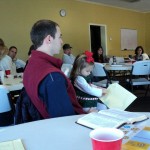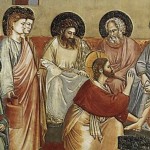Replay: Running and Maturity in the Church
Two years ago, at the end of the summer of 2009, I wrote a post called “Running and Maturity in the Church.” Margaret (my wife) and I had decided to train to run in a 5k race, mainly to get in shape. It didn’t work out for several reasons. But, getting back into running as exercise helped me understand something about spiritual gifts. I hope you enjoy this post.
——————————
Running and Maturity in the Church
Last Summer, my wife Margaret and I decided to walk together in the mornings. I learned alot about community during our walks together (see my post “Walking Together“).
This Summer, we tried to walk together again. For some reason, we were having a difficult time remaining motivated. Some friends decided that they were going to start training for a marathon in February. I’m not ready to commit to a marathon, but I decided to start training for a 5k in October. (You probably know this already if you follow me on Twitter or read my Facebook status updates.)
So, last week, Margaret and I began training for the 5k. The difference between our 5k training and our walking last summer is that we have to run some for our 5k training. Eventually, we will only run. But, of course, we’re not ready for that yet.
When I was in middle school (we called it junior high school) and high school, I could run long distances. But, years and years of sitting behind a computer screen has taken a toll on my body. I need this exercise and I need to get back in shape, so I’m excited about the prospects. Plus, I’m more motivated now that I have a specific goal: the 5k in only a few weeks, and perhaps a 1/2 marathon in February if everything goes well.
But, I’ve learned something about the body over the last few days that I think is applicable to the church as the body of Christ. When I started running, I realized that my body is not in shape to do what it needs to do. However, it wasn’t every part of my body that was holding me back.
My arms were working just fine, and if I left it up to my arms, I could run for long distances. Similarly, my eyes and ears and nose were very happy to keep running long after I had to stop.
Surprisingly, even my legs and feet were able to carry be farther than I expected. Yes, my legs – especially my calves – would be tired after running. However, if I left everything up to my legs, I could have kept running longer.
But, my lungs would not allow me to run any longer. My breathing is not where it needs to be to be able to run long distances. Therefore, right now, I’m training my lungs and breathing as much as – and perhaps more than – I’m training my legs.
It is very interesting to me that my lungs are hidden from sight. I can’t see them, and they don’t appear to be very important from an outward perspective. But, unless my breathing capacity increases, I won’t be able to run for long distances.
I could spend hours exercising my legs and arms, my chest and abs, but unless I exercise my lungs, I will not be able to do what I need to do.
This reminded me to two specific passages in Scripture dealing with the church. First, consider this passage from 1 Corinthians:
But as it is, God arranged the members in the body, each one of them, as he chose. If all were a single member, where would the body be? As it is, there are many parts, yet one body. The eye cannot say to the hand, “I have no need of you,” nor again the head to the feet, “I have no need of you.” On the contrary, the parts of the body that seem to be weaker are indispensable, and on those parts of the body that we think less honorable we bestow the greater honor, and our unpresentable parts are treated with greater modesty, which our more presentable parts do not require. But God has so composed the body, giving greater honor to the part that lacked it, that there may be no division in the body, but that the members may have the same care for one another. If one member suffers, all suffer together; if one member is honored, all rejoice together. Now you are the body of Christ and individually members of it. (1 Corinthians 12:18-27 ESV)
It is obvious that every part of the body of Christ is important – even those parts that may be less noticeable and may seem less important. In fact, according to Paul, these parts are even more important than we think because God has given those parts greater honor.
Second, consider this passage from Ephesians 4:
And he gave the apostles, the prophets, the evangelists, the pastors and teachers, to equip the saints for the work of ministry, for building up the body of Christ, until we all attain to the unity of the faith and of the knowledge of the Son of God, to mature manhood, to the measure of the stature of the fullness of Christ, so that we may no longer be children, tossed to and fro by the waves and carried about by every wind of doctrine, by human cunning, by craftiness in deceitful schemes. Rather, speaking the truth in love, we are to grow up in every way into him who is the head, into Christ, from whom the whole body, joined and held together by every joint with which it is equipped, when each part is working properly, makes the body grow so that it builds itself up in love. (Ephesians 4:11-16 ESV)
According to this passage, the body grows (matures) when every part of the body is allowed to do its own work – when every part of the body is allowed to do what it is designed to do. We are not the same, but we need each other. From the negative perspective, if one part of the body is not “working properly”, then the body will not mature.
In my illustration from running, if I exercise my legs, arms, chest, etc. then those parts of my body will get stronger, but my body as a whole will not. The church is to be concerned with the maturity of the whole body, not just with their own maturity.
There are times when I need to stop exercising before my legs or arms are completely tired in order to allow my lungs to grow in capacity. There are times when those “more presentable” parts of the church should allow the “less presentable” to work, even if the “more presentable” could “do a better job”. Why? Because by allowing the “less presentable” parts to work, then the whole body is allowed to grow in maturity.
By the way, I’ve also found that when I allow my lungs to dictate how much I can run, my legs actually get a good workout. Those of us in the church who are more “noticeable” may (ummm… will) find that even we grow and learn when we allow the “less noticeable” to do the work. In fact, it is worth it to our own growth and the growth of the body for us to shut up occasionally and to encourage others to speak or serve instead – as long as we’re willing to listen and learn from them.
Thinking about itinerant servants and the church
Paul, Barnabas, Timothy, Silas, Peter, Mark, and many other people mentioned in the New Testament were itinerant at least for a while.
Itinerant, in this sense, means that they moved around from place to place proclaiming the gospel and strengthening churches. Itinerant also means that they did not intend to stay in one place permanently. Sometimes they stayed in one place a few days; sometimes a few weeks; sometimes a few months; sometimes even a few years. But, the intention was always to keep moving, as long as they considered themselves itinerant.
I’m using the term “itinerant” instead of other possible descriptions. For example, I could call these people “apostolic,” but that term has been misused and hijacked lately, I think. (But I do believe that being itinerant is related to the spiritual gift of apostleship.) I could also used the terms “emissary” or “representative” or “ambassador” but those terms have a governmental or political connotation today.
So, while I’m thinking about “itinerants” – and I plan to write about this more in the coming days – I have a couple of questions for you, my readers, to help me think through this topic.
1) Is there a better term than “itinerant” to describe a person who travels from place to place without the intention of remaining in that place in order to proclaim the gospel and strengthen the church?
2) How does the scriptural view of the “itinerant” contrast or compare with different types of servants (“minister”) today?
3) Do you think there is a place and/or need in the church today for itinerant servants? Why or why not?
Where’s my super suit?
You know that scene from the animated “The Incredibles” right? It’s one of my favorite scenes of all time.
Lucius (a friend of Bob Parr a.k.a. Mr. Incredible) is preparing to come out of retirement as Frozone to battle the evil Syndrome.
But, there’s one problem. He has a date with his wife Honey. Here’s the dialog from the scene:
Lucius: Honey?
Honey: What?
Lucius: Where’s my super suit?
Honey: What?
Lucius: Where – is – my – super – suit?
Honey: I, uh, put it away.
[helicopter explodes outside]
Lucius: *Where*?
Honey: *Why* do you *need* to know?
Lucius: I need it!
Lucius had been living as a normal person. But, now that there was trouble and he felt needed, he was ready to jump into action as the superhero Frozone. (Of course, Honey had other plans.)
But, I think many Christians live life like Frozone. No, not as superheros in hiding… although, it is something like that.
Instead, they think that God cannot and will not use them unless everything is just right: they’ve had their “daily quite time” or they’ve been reading Scripture regularly or they’ve attended the right kind and right number of church meetings or they’ve had a certain amount of education and training or they hold a certain position in the church.
Nothing could be further from the truth. For those of us who are God’s children (that is, we’re saved and indwelled by the Holy Spirit), then God is ready, willing, and able to work in and through us in a variety of ways.
God is not waiting for us to find our “super suit.” Instead, he’s waiting for us to begin working to serve others so that he can then work through us.
What? God is waiting for us to work? Yes. God works through the efforts of his children. While studying Colossians, I saw this clearly in the following statement that Paul made about his own work for the gospel and for the church:
For this I toil, struggling with all his energy that he powerfully works within me. (Colossians 1:29 ESV)
Paul is working hard, but as he works he finds that God is providing the energy he needs to get the work done. I think the same concept can be found in other parts of Scripture as well.
There are no “super” Christians. There are followers of Christ who are working for others, and there are those who are not working for others. There are Christians who are love God by loving others, and there are those who are not loving God or others. There are believers who are serving through the gifts that the Spirit has given, and there are those who choose not to use their gifts to serve others.
Stop looking for or waiting for your super suit. As I’ve told many people: God is able to more through you than you think (regardless of what you think).
So, start serving others (working hard or toiling at serving others) and give God a chance to empower you as well.
Who should teach?
In his latest post, Eric from “A Pilgrim’s Progress” presents another article in his series on house church: “House Church – Teaching.”
(By the way, it should be mentioned that Eric is presenting a particular form of meeting as a “house church.” All house churches do not follow what Eric is describing.)
In his post, Eric presents scriptural evidence that elders should teach, those gifted as teachers should teach, and others should teach as well.
I like the way that he concludes best of all. Eric points out that while teaching with words is important, teaching through actions is usually more effective:
Teaching, then, ought to be more than just verbal instruction. Â Teaching is most effective when it is experienced. Â Therefore, in the life of the church we best teach and are taught through both hearing and doing. To follow the model set forth by our Lord, we teach and learn through service to others.
In fact, I would say that teaching with words becomes effective only when it is combined with teaching through actions.
What do you think?
Mutual edification in Romans?
But, I thought Romans was a theology book?
Well, my friend Jason from “Second and Content” wrote about “Mutual Encouragement [in] Romans 1:8-15.” You may remember Jason from the videos interviews that we’ve been doing (see part 1 and part 2 – we’re hoping to tape part 3 this weekend).
According to Jason, Paul begins his letter to the Romans with a desire to get together with them so that they can all mutually encourage one another. Of course, Jason gets that from this sentence in Paul’s opening section:
For I long to see you, that I may impart to you some spiritual gift to strengthen you -Â that is, that we may be mutually encouraged by each other’s faith, both yours and mine. (Romans 1:11-12 ESV)
Wow… Paul was expecting these Roman Christians to encourage him, just as he was expecting to be an encouragement to them. Paul? The great theologian and missiologist? How could someone have anything to offer him?
Well, because Paul knew that those Roman Christians were indwelled by the Holy Spirit, just like Paul was. That is the only ingredient necessary for mutual edification, assuming of course that we don’t get in the Spirit’s way.
Read Jason’s post. He also of really good things to say.\
(By the way, congratulations to Jason on graduating from college today!)
Spiritual Gifts Series
Three years ago, I wrote a series of posts about spiritual gifts. During the series, I wrote about each “list” of spiritual gifts that we find in Scripture. I don’t think any of the lists are exhaustive, nor do I think the authors wrote those lists so that people can know what the spiritual gifts are. Instead, the authors had specific reasons to write each list, and we can learn alot about spiritual gifts by looking at how the list is used in context. Below you will find the conclusion of that series, and at the bottom of that post, you will find a link to each of the posts about spiritual gifts.
———————————————————————————
The goal of this study and this series of posts was to study passages which included lists of spiritual gifts in order to determine what the writer was saying about spiritual gifts. As we’ve looked through these lists of spiritual gifts, there are several general things that we can take from our study.
First, the actual exercise, description, or definition of the gifts involved was never the emphasis for the author. In fact, we are never told exactly what the gift of apostleship entails. The gifts of tongues and giving are never described. We are not told how to exercise the gifts of prophecy or administration. The authors do not explain the differences (if there are any differences) between word of knowledge, word of wisdom, prophecy, teaching, exhortation, etc. Perhaps we can glean certain information about the various gifts from other passages of Scripture. But, if exercising, describing, or defining the gifts are never the emphasis of Scripture, then why do we emphasize this so much?
Second, we are never told to find out what our spiritual gift is. Never. Not once. Instead, we are told that God gifts us as He desires. He chooses how to use our speaking and our serving. We don’t decide. Think about this for a moment. If I speak to a group of people, some people may be taught, others may be encouraged, others may receive it as prophecy – all from the same instance of speaking. Which gift did I exercise? I suggest that I did not exercise any of the gifts. I simply spoke as God directed, and he used the speech as he chose – to teach some, to exhort others, etc. Perhaps, then, Peter’s exhortation in 1 Peter 4:10-11 would be the best to consider when we are going to speak or serve. We should not ask ourselves if we have the gift of teaching, but if we are speaking the words of God. We should not ask ourselves if we have the gift of serving, but are we serving in the strength that God provides.
Third, the gifts and the categories are not as clear cut as we would like to make them. I’ve already mentioned that Scripture does not tell us the difference between words of knowledge, words of wisdom, prophecy, teaching, exhortation, etc. Most definitions and descriptions come from human attempts to pull out of Scripture what is not there. Even speaking and serving are not distinctive categories. Is the gift of apostleship a speaking or serving gift? Yes. What about pastoring? Yes, again. I think this is true for all of the “gifts”. They will all include aspects of speaking and serving. Even teaching – because we are told that teaching involves both what we say and how we live.
Fourth, love is emphasized in several of the passages that list spiritual gifts. Sometimes we only give a wink and nod at love, but without love, “spiritual gifts” are not spiritual gifts. As Paul said, I can speak or give or prophesy, but without love its all nothing. Perhaps, the next time we prepare to speak or serve, we should start by asking ourselves if we are loving the people that we want to speak to or serve. If not, then we should start with that – work out the problems before we ever start to speak or serve. Otherwise, we are doing nothing.
Fifth, we are not given spiritual gifts for our own benefit. We are given gifts by God for the benefit of others. God uses our words and our actions to exhort, comfort, edify, etc. those around us. If we are more concerned with what we are getting out of our speaking or serving, then we are not exercising spiritual gifts. In fact, if speaking and serving for the benefit of others bring glory to God (which Peter says), then speaking and serving for our own benefit do not bring glory to God.
Sixth, spiritual gifts are never connected to leadership. I’m not saying that leaders do not have spiritual gifts. However, we do not choose leaders because of their spiritual gifts. I realize that this is contrary to much contemporary teaching, especially teaching surrounding the five-fold ministries. However, if these five gifted individuals are necessary for the birth or growth of a church, it would seem that Paul or someone would have been a little more clear. Even the spiritual gift of teaching is not necessary for a leader. A leader should teach – but then, every believer is supposed to teach. Instead of choosing leaders based on their giftedness, believers should follow those who best exemplify the characteristics that all believers are supposed to have.
Seventh, and finally, when the church gathers, it should not be a one man – or even a two man – show. In fact, every believer should expect to speak to or serve brothers and sisters whenever they get together with them. Multiple people speaking or serving one at a time is not disorder – in fact, this is Paul’s very definition of order. We miss what God wants to say to us and what God wants to do among us when we do not allow everyone to speak and serve as God directs. Will it be messy? Probably. But, people are messy, and we are fooling ourselves if we think our highly planned and efficient meetings keep people from being messy. If anything, our meetings hide the messiness, or sweep it under the rug, instead of actually dealing with people and their lives and their messes.
I would love to hear what you have to say about spiritual gifts.
———————————————————————-
Series on Spiritual Gifts
1. Introduction
2. Romans 12:6-8
3. 1 Corinthians 12:8-10
4. 1 Corinthians 12:28-30
5. 1 Corinthians 14:26
6. Ephesians 4:11
7. 1 Peter 4:10-11
8. Conclusion
Talented or Gifted
In the comments of my post “Admonish One Another,” Rick brings up a good question:
Too often we pour Christian sauce over normal human behavior. We talk about “sweet fellowship†as if it were much different from everyday socializing. I once attended a church where there was much talk of how we would “dance before the Lord†at the annual Fall Festival, even though nothing distinguished it from the square dancing that happened all over town every Friday and Saturday night.
I have admonished and been admonished at work, in school, in grocery stores, during music lessons, at the DMV and public library, by our bookstore customers, at church and outside church. It is something that people do, Spirit-filled or not. Do you think this is the behavior that Paul describes in Romans 15:14?
His comment reminded me of a discussion that I’ve been having with several people over the last few weeks (maybe months now).
The discussion centers around this question: What is the difference (if anything) between a talent and a spiritual gift? Is there a difference between a talented teacher and a spiritually gifted teacher? Can a talented teacher not be a spiritually gifted teacher? Can a spiritually gifted teacher not be a talented teacher? (Feel free to use any spiritual gift to discuss these questions.)
What do you think?
The Apostles Were Apostles
Yeah, the title of this post sounds strange. But, there’s a reason to my madness.
There is alot of confusion today about apostles. In fact, this confusion has continued for thousands of years (well, about two thousand years). It’s not that I’ve figured out something that no one else has ever figured out. Many people understand the difference between apostles and apostles. But, there are many who are still confused.
You see, it all began with the apostles… the twelve… those twelve men that Jesus originally called so that he could send them out.You can see this in Matthew 9-10:
And Jesus went throughout all the cities and villages, teaching in their synagogues and proclaiming the gospel of the kingdom and healing every disease and every affliction. When he saw the crowds, he had compassion for them, because they were harassed and helpless, like sheep without a shepherd. Then he said to his disciples, “The harvest is plentiful, but the laborers are few; therefore pray earnestly to the Lord of the harvest to send out laborers into his harvest.” And he called to him his twelve disciples and gave them authority over unclean spirits, to cast them out, and to heal every disease and every affliction. The names of the twelve apostles are these… These twelve Jesus sent out… (Matthew 9:35-10:5)
The word “apostle” simply indicates that the person is a representative of someone else sent out for some person. Often, it can be translated as “messenger.” An “apostle” is differentiated from other in that the apostle is “sent out.” In fact, the noun “apostle” comes from a verb that means “to send,” as in Matthew 10:5.
Thus, the Twelve (the Apostles) were apostles. They were “sent out” by Jesus both before and after his death and resurrection. They were specifically told to make disciples of all the nations (indicating being sent) (Matthew 28:19-20) and that they were to be witnesses of Jesus to the end of the earth (also indicating being sent) (Acts 1:8).
So, the apostles (the Twelve) were apostles (those who are sent out).
The difficulty comes in recognizing that others in Scripture are also called apostles even though they were not part of the Twelve. The designations are not the same. The Twelve (including Paul?) were a special type of apostle who had been personally commissioned by Jesus. However, there were other apostles in Scripture who were not part of the Twelve.
In Acts 14:14, Barnabas is called an apostle. In 1 Thessalonians 2:6, Paul indicates that Timothy and Silas are apostles (see 1 Thessalonians 1:1 for the identification of “we”). 1 Corinthians 4:9 indicates that Apollos was an apostle (see 1 Corinthians 4:6).
Finally, in 1 Corinthians 15:3-8, Paul makes a clear distinction between “the twelve” and “the apostles.”
Thus, the Twelve (and Paul) were apostles, but others were apostles as well. There is, then, no reason not to identify Andronicus and Junia as being “among the apostles” in Romans 16:7. The indication only means that Andronicus and Junia were “sent out” away from their home in order to proclaim the gospel and strengthen the churches as they went.
The apostles were apostles, but there were other apostles who were not counted among the Twelve. From the very early days after the death of the Twelve, Christians have argued about the continuing existence of apostles. The Twelve no longer exist. But, there is no reason to assume that there are no apostles today. In fact, Scripture seems to indicate that the church continues to need apostles just as we continue to need all gifted believers.
Serving when not spiritually gifted
(I am interrupting my translation of Ruth for the next few weeks. I’ll return to the translation after I return from Ethiopia.)
A couple of days ago, I wrote a post called “Exclusivity of Spiritual Gifts.” In that post, I suggested that there is a difference between a certain function and the spiritual gift related to that function. Thus, someone who is NOT gifted in a certain way could still function in that same way. Although, those gifted in a certain way would probably function in that way more consistently or regularly.
In response, Mark said the following in a comment:
I believe the Lord is currently using me as a “sent oneâ€, to do a specific task in my community, but I don’t believe that I am an apostle.
I asked if he would explain what he meant, and he left a longer comment. I thought Mark’s comment was too good to leave in the comments:
As an answer to your question let me preface by saying the following. I strongly believe that the Spirit is moving to build a true expression of the Body of Christ on the earth, something that hasn’t had consistent visibility for a long time. There just seems to be such a great “calling outâ€. Having said that, I believe that the work he has me doing “as an apostle†is along those lines.
My wife and I own two businesses in our town, she a coffee shop/scrapbook store/bridal registry/catering business, etc., and me a family medicine clinic. Her business has been open 3 years, mine 2 years. We strongly feel like these business are the work of the Lord in our community, as the opportunity to touch others’ lives is tremendous. In the last year He has begun knitting us together with some individuals who have begun walking outside of traditional Christianity. In the last year the group has gone from being just a “bible study†among friends, that would meet sometimes and sometimes not, into a fledgling community, where we understand more and more what we are and who we are, and can identify that there is more going on here than just a “bible studyâ€. Now, to answer your question. I feel that I am here plowing ground, hard, crusted ground. I feel that we have been sent here for a specific task, to do the groundwork for the ultimate work that He wants to do. As such, I feel like we are “sent onesâ€, as I believe He had this specific task in mind for us, and uniquely prepared us for it. Beyond the manner in which we are currently functioning, I don’t see myself as an apostle, as I stated in my post. I believe I will be in this community for many years, and serve within this local body until much later in life, if not until He takes me.
I hope this is an adequate explanation.
And, I hope that you enjoyed Mark’s explanation as much as I did.
(To Mark: Thank you for allowing me to post this comment. I didn’t have a link to your blog or website, but if you send it to me, or leave it in the comments, I’ll be glad to add it to this post.)
Exclusivity of Spiritual Gifts
There are several lists of spiritual gifts in the New Testament:
From Romans 12:6-8, we find the following gifts (or gifted persons):
prophesying
serving
teaching
encouraging
leading
giving
showing mercy
From 1 Corinthians 12:8-10, we find the following gifts (or gifted persons):
speaking wisdom
speaking knowledge
showing faith
healing
working miracles
prophesying
distinguishing spirits
speaking in tongues
interpreting tongues
From 1 Corinthians 12:28-30, we find the following gifts (or gifted persons):
being sent (apostle)
prophesying
teaching
working miracles
healing
helping
administrating
speaking in tongues
From Ephesians 4:11, we find the following gifts (or gifted persons):
being sent (apostle)
prophesying
evangelizing
shepherding/teaching
Now, notice that some of the gifts are considered “special” gifts today, while others are considered more ordinary. However, in the lists, they are all mixed together with very little (if anything) to differentiate what we might consider special gifts from ordinary gifts.
Modern church wisdom indicates that those with certain spiritual gifts are responsible for that particular function. For example, those gifted as an apostle are supposed to function as an apostle.
This seems to work well with what we might consider “special” gifts. But, what about the “ordinary” gifts? Why do we not say that only those gifted with giving are responsible for giving? Why do we not think that only those gifted as servants are responsible for serving?
Is it possible that the concept of gifting and function are not exactly related the way that I’ve presented? Are there other possibilities?










